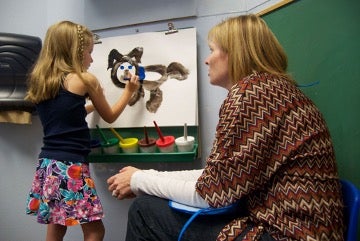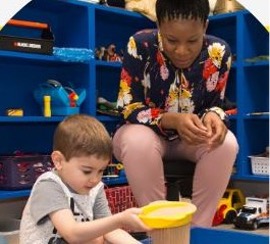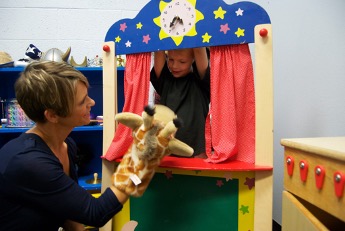Playing for the Future
 Play therapy is grounded in the healing properties of play for children. Research shows it is an effective intervention to treat a wide range of childhood disorders and difficulties that interfere in children’s healthy development and academic achievement. Indeed, the outcomes of a three-year partnership between the Hogg Foundation and the Center for Play Therapy (CPT) at the University of North Texas were promising.
Play therapy is grounded in the healing properties of play for children. Research shows it is an effective intervention to treat a wide range of childhood disorders and difficulties that interfere in children’s healthy development and academic achievement. Indeed, the outcomes of a three-year partnership between the Hogg Foundation and the Center for Play Therapy (CPT) at the University of North Texas were promising.
As the natural language of childhood, play allows children to better express their feelings, thoughts, and experiences than words. Indeed, play therapy is to children what counseling is to adults.
For over 20 years, the Center for Play Therapy (CPT) at the University of North Texas has engaged in community and school outreach, providing play therapy services at sliding scale fees and promoting the growth and development of children in a region of Texas with significant need.
Of the more than 200,000 children under the age of 18 living in Denton County, Texas, 1 in 10 live in poverty, 1 in 5 do not know where their next meal will come from, and 1 in 3 are at risk of dropping out of school. In 2015, the Center for Children’s Health at Cook Children’s Medical Center Fort Worth reported that over 10 percent of children in Denton County experienced mental health issues, with parents citing affordability as the number one reason for lack of mental health care.
Inside this story:
- Former Hogg Foundation grantee, the Center for Play Therapy at University of North Texas, continues to make a positive, sustainable impact with its Play for the Future: Linking Mental Health to Academic Achievement for Young Children initiative.
- Play therapy establishes a “dynamic interpersonal relationship between a child and a trained therapist” and provides a child with opportunities to express feelings, thoughts, experiences, and behaviors through play.
- Comprehensive play therapy interventions in Denton County elementary schools lead to improved social, emotional, and academic outcomes in children with a history of adverse childhood experiences.
children in Denton County is at risk of dropping out of school.
Center for Play Therapy
CPT describes play therapy as a process that establishes a “dynamic interpersonal relationship between a child and a trained therapist.” By providing carefully selected toys and nurturing a safe relationship, play therapists create an environment that equips a child to express his or her feelings, thoughts, and experiences.
Established in 1987, CPT focuses on research and training, serving as the largest graduate-level training program in play therapy world-wide. For more than twenty years, graduate students have provided clinical services in area elementary schools while also evaluating its impact on children’s mental health and academic performance.
Play for the Future
Building on the positive outcomes of their work and well-established relationships with educators in Denton County schools, in 2017 CPT initiated a three-year project with support from the Hogg Foundation, Play for the Future (PFF): Linking Mental Health to Academic Achievement for Young Children. It was a welcome opportunity to develop a more comprehensive and holistic school-based play therapy program for children in need.
Under the leadership of Dr. Dee Ray (director of the Center for Play Therapy; former director of the Child and Family Resource Clinic-UNT), Dr. Natalya Lindo (UNT Counseling Program coordinator), Dr. Peggy Ceballos (School Counseling Coordinator – UNT), and Dr. Elizabeth Burgin (former doctoral student and PFF Project Manager), this new initiative expanded CPT’s existing play therapy services.
“We went in with all the interventions that we find work for children with complex trauma,” says Ray, “In addition to our existing play therapy sessions, we had child-parent relationship therapy and child-teacher relationship therapy. We also had more culturally responsive interventions, like Spanish-speaking therapists, and developed long-term mental health plans for schools.”
Trauma’s Impact on Academic Success
PFF focused primarily on addressing the mental health and environmental issues that interfere with a child’s ability to succeed in school.
“Children who have multiple adverse experiences and trauma events are likely to have poorer academic outcomes including failing a grade, lower standardized test scores, and discipline problems,” says Ray.
By identifying children at-risk and facilitating integrated mental health services with them, their caregivers, and their teachers, PFF aimed to improve the school community’s overall mental health climate, and thereby improve students’ academic outcomes.
Children who have multiple adverse experiences and trauma events are likely to have poorer academic outcomes including failing a grade, lower standardized test scores, and discipline problems.
Building Trust
Elizabeth Burgin, a graduate student during the initiative, served as the program’s project manager, supporting a clinical team of 25 physical therapists, coordinating therapy sessions for over 100 children a week, and addressing a wide variety of critical logistical needs.
“We partnered with seven schools, each with a really unique culture and a really unique set of challenges that we needed to work through,” says Burgin.
She found that establishing trust with participating families was essential to the success of the program.
“We wanted to make sure families felt safe being involved with us,” says Burgin. “It was important to build trust with communities who may have had past experiences with systems that had not been trustworthy.”
These efforts paid off, with less than one percent of the families who were offered play therapy services declining to participate.
“We did a good job [establishing trust],” says Ray. “But it also speaks to the level of need these families have. They’re looking for services for their children but can’t afford them. They’re not accessible.”
We partnered with seven schools, each with a really unique culture and a really unique set of challenges that we needed to work through.
Play Therapy in Practice
 Play for the Future’s investment in Denton area schools was significant. During its three years, the initiative facilitated individual or group play therapy with 292 children identified by the school as being at-risk or in need of services due to adverse childhood experiences. PFF delivered a total of 3,287 play therapy sessions, with most children receiving 16 individual sessions.
Play for the Future’s investment in Denton area schools was significant. During its three years, the initiative facilitated individual or group play therapy with 292 children identified by the school as being at-risk or in need of services due to adverse childhood experiences. PFF delivered a total of 3,287 play therapy sessions, with most children receiving 16 individual sessions.
Forty percent of school staff received mental health or play therapy-related services, including 283 teacher consultation sessions for 135 teachers and administrators and a Child Teacher Relationship Building group at five schools in which 11 teachers participated.
The initiative also provided 450 parent consultation sessions to 181 parents and facilitated nine Child Parent Relationship Therapy groups at five schools in which 47 parents participated.
Finally, all seven participating schools received ongoing mental health consultations throughout the year addressing child academic placement, disciplinary actions, and recommendations for implementing trauma-informed practices on campus.
play therapy sessions provided for children identified by the school as being at-risk or in need of services due to adverse childhood experiences.
Facing challenges
The initiative also came up against serious challenges. Despite teachers’ and caregivers’ support for play therapy, at times they faced barriers to participation. Teachers’ time and energy was limited due to heavy workloads and full schedules, while some caregivers faced logistical difficulties such as lack of transportation or irregular schedules.
The COVID-19 pandemic also interrupted the work of PFF significantly. Beginning in March 2020, in-person play therapy and child-teacher relationship therapy services ended. Child-parent relationship therapy groups went online, but participation declined.
Promising Outcomes
Thankfully, program leaders had collected the bulk of their research data in the fall of 2019 prior to the school closures. They found that despite the challenges, PFF outcomes were impressive.
Of the children who participated in play therapy, 90 percent showed improved performance on the Early Academic Composite of the Young Children’s Achievement Test, surpassing the initial goal of 80 percent improvement. Eighty-two percent of children demonstrated improvement in social-emotional competencies as reported by a teacher or caregiver, also exceeding the initiative’s original goal.
Additionally, therapists conducted training on trauma-informed schools for all teachers and counselors, created a parent website to explain the play therapy program and garner support, and created play-at-home curriculum modules for children and parents to use online.
%
of students participating in play therapy showed improved performance on the Early Academic Composite of the Young Children’s Achievement Test
Looking to the Future
 The Hogg Foundation grant concluded in the spring of 2020, and PFF was discontinued in the schools in the fall. By the spring of 2021, however, school administrators recognized that their students needed support services more than ever and invited the program to return.
The Hogg Foundation grant concluded in the spring of 2020, and PFF was discontinued in the schools in the fall. By the spring of 2021, however, school administrators recognized that their students needed support services more than ever and invited the program to return.
With fewer resources available, play therapy services resumed during the 2021-2022 school year on a smaller scale. Only individual student therapy and child-parent relationship therapy has been available. Fortunately, CPT will have the resources to bring back child-teacher services in the coming year.
“It’s been a rough year,” says Ray. “Kids are hurting, so schools were really excited to have us back.”
To sustain play therapy services and students’ academic success long-term, CPT plans to increasingly focus on training teachers and caregivers to provide play therapy services themselves.
“They understand that their kids need these services and what a benefit it is for them academically,” says Ray. “We want them to continue on.”
